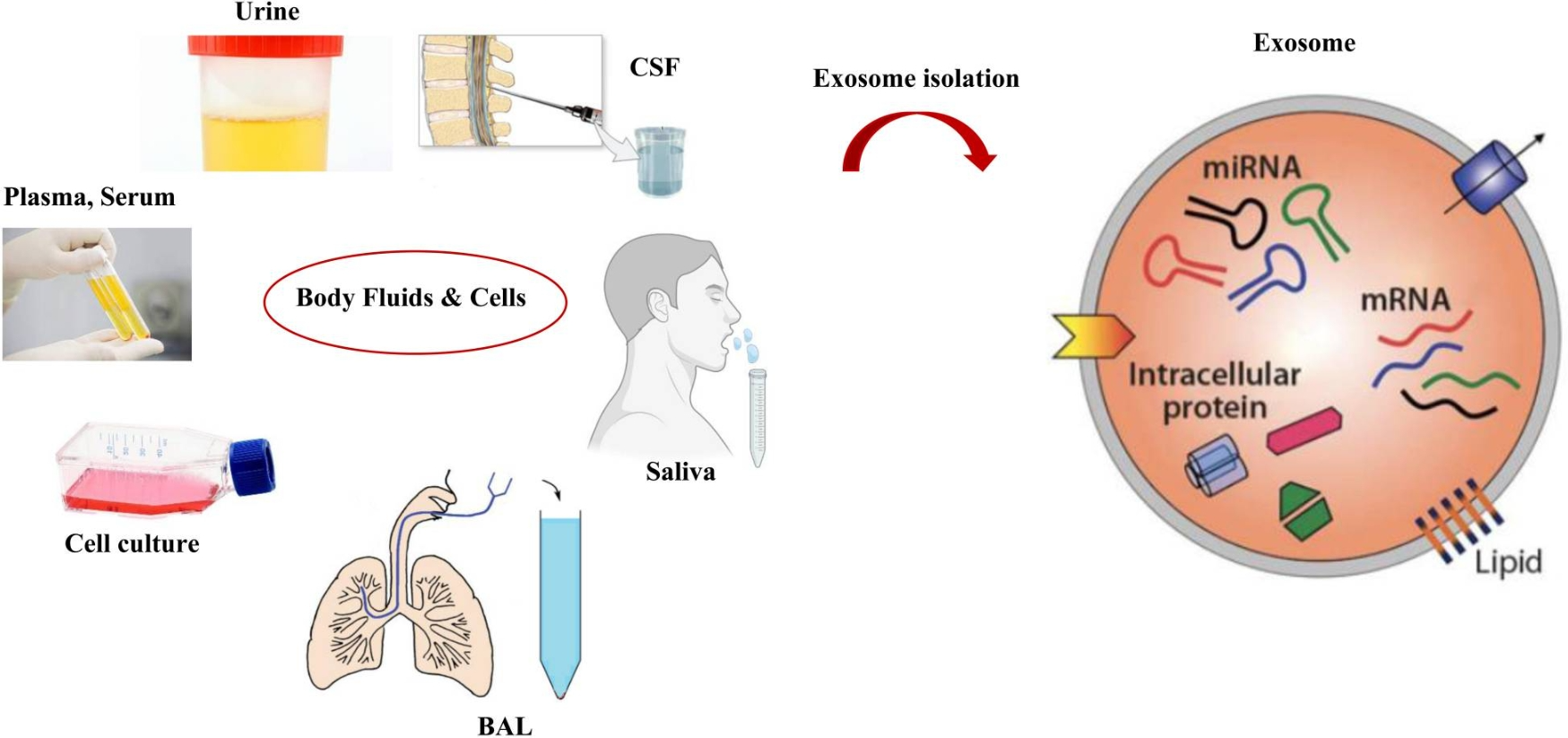Body Fluid-derived Exosome Isolation and Development Service
- High-efficiency isolation of exosomes from a variety of body fluids
- Comprehensive characterization of exosome morphology, particle size distribution, concentration, and purity
- Profiling of exosomal proteins, miRNAs, mRNAs, and other nucleic acid components
- Screening of exosomal biomarkers and validation of their biological functions
- Engineering and modification of exosomes, including drug loading studies
- Discovery and validation of biomarkers for cancer and other diseases
- Diagnostic and therapeutic research for cardiovascular and neurodegenerative disorders
- Development and optimization of exosome-based drug delivery systems
- Investigation of exosomes in regenerative medicine for cell repair and tissue regeneration
- Mechanistic studies of exosome-related pathophysiological processes
Exosomes are nanoscale extracellular vesicles (30–150 nm in diameter) secreted by cells, enriched with proteins, lipids, and nucleic acids, and widely distributed in various body fluids, including plasma, urine, saliva, cerebrospinal fluid (CSF), amniotic fluid, breast milk, and others. As heterogeneous vesicles, Body fluid-derived exosomes (BF-Exos) carry critical biological information that reflects the physiological and pathological states of their parent cells. They have become essential tools for early disease diagnosis, biomarker discovery, and personalized medicine development.

Jafari, A. et al. Technol Cancer Res Treat. 2023.
Figure 1. Overview of Exosome Isolation from Various Body Fluids
· Plasma/serum-derived exosomes: Reflect systemic disease conditions and are suitable for biomarker discovery and mechanistic research related to cancer, cardiovascular diseases, and metabolic disorders.
· Urine-derived exosomes: Contain valuable information about urinary and renal diseases, enabling non-invasive diagnostics and real-time disease monitoring.
· Saliva-derived exosomes: Enriched with molecules associated with oral and gastrointestinal systems, making them ideal for non-invasive screening of oral and digestive tract diseases.
· Cerebrospinal fluid (CSF)-derived exosomes: Carry nervous system-related molecules, widely applied in research on neurodegenerative diseases and brain tumors.
· Amniotic fluid-derived exosomes: Abundant in fetal development-related molecules, applicable for monitoring maternal health and fetal disorders.
· Breast milk-derived exosomes: Secreted from mammary epithelial cells, they are involved in maternal-infant health, nutrition, and immune modulation, with potential for drug delivery system development.
· Interstitial fluid-derived exosomes: Mediate local microenvironmental communication, valuable for investigating tissue-specific diseases and signaling mechanisms.
However, the isolation and characterization of body fluid-derived exosomes are technically challenging due to the complex protein milieu, high vesicle heterogeneity, and difficulty in distinguishing exosomes from other extracellular particles. To address these challenges, MtoZ Biolabs offers Body Fluid-derived Exosome Isolation and Development Service which provides an integrated solution encompassing sample pretreatment, exosome isolation and characterization, and functional analysis, thereby supporting both fundamental research and translational applications.
Services at MtoZ Biolabs
To meet the diverse research needs of our clients, Body Fluid-derived Exosome Isolation and Development Service delivers integrated and systematic solutions for exosome research. Our offerings cover exosome isolation, accurate quantification, compositional analysis, and functional validation, including but not limited to:
Analysis Workflow
Our Body Fluid-derived Exosome Isolation and Development Service adopts a rigorously controlled workflow to ensure the precision and reproducibility of exosome isolation and downstream analysis:
1. Sample Pretreatment: Collection and preliminary processing of body fluids to remove cellular debris and large particles.
2. Exosome Enrichment: High-efficiency exosome concentration using ultracentrifugation, density gradient centrifugation, or microfluidic chip-based methods.
3. Exosome Purification and Identification: Verification of exosome identity via nanoparticle tracking analysis (NTA), transmission electron microscopy (TEM), and specific protein markers such as CD63 and CD81.
4. Component Analysis and Functional Validation: Proteomics and RNA-seq analyses for in-depth compositional profiling, combined with biological function assays.
5. Customized Development Services: Tailored exosome modification and drug delivery capacity evaluations based on specific research objectives.
Why Choose MtoZ Biolabs?
By choosing MtoZ Biolabs’ Body Fluid-derived Exosome Isolation and Development Service, clients gain access to advanced technology platforms and a highly skilled scientific team, ensuring reliable and high-quality results:
· Advanced Technologies: A wide range of cutting-edge isolation methods and high-throughput analytical platforms to ensure high-purity and high-yield exosome preparation.
· Accurate Analysis: Supported by state-of-the-art mass spectrometry and next-generation sequencing systems for in-depth multi-omics profiling of exosomes.
· Extensive Expertise: A team of experts with rich experience in exosome biology provides customized and professional research solutions.
· Efficiency and Reliability: Standardized workflows and stringent quality control processes ensure fast turnaround and consistent data quality.
Applications
Body Fluid-derived Exosome Isolation and Development Service offers broad applications for both academic and industrial research, with significant potential in biomedical and clinical fields, including but not limited to:
FAQ
Q1: Do exosomes derived from different body fluids require distinct isolation methods?
Yes. Exosomes from various body fluids may differ in size, density, and molecular composition. MtoZ Biolabs applies optimized, fluid-specific isolation methods to ensure maximal purity and biological activity.
Q2: How can we confirm that the isolated particles are exosomes rather than other vesicles?
We perform comprehensive cross-validation using multiple characterization approaches, including TEM, NTA, and detection of canonical exosomal markers, to meet the standards set by the International Society for Extracellular Vesicles (ISEV).
Q3: What are the main advantages of analyzing exosomes compared to whole fluid samples?
Exosomes offer critical advantages, primarily through reducing the complexity of biological fluids. They encapsulate disease-specific proteins, RNAs, and other molecules, providing enriched sources for biomarker discovery and mechanistic studies. This is especially advantageous in fluids like plasma, where abundant proteins might otherwise obscure low-abundance disease markers.
What Could be Included in the Report?
1. Detailed analysis of exosome concentration and particle size distribution
2. High-resolution TEM images of exosome morphology
3. Results from exosome-specific protein marker assays
4. Exosomal proteomics datasets
5. Nucleic acid analysis reports, including miRNA and mRNA profiling
6. Functional assay results validating exosome biological activity
MtoZ Biolabs is dedicated to delivering high-quality, customized exosome solutions through advanced technologies and expert support. Our Body Fluid-derived Exosome Isolation and Development Service provides efficient and reliable workflows to facilitate biomarker discovery, disease research, and exosome-based applications, driving progress in both scientific and translational fields.
How to order?







